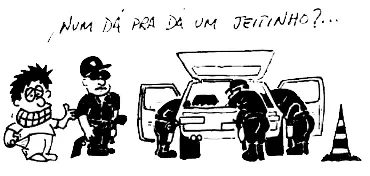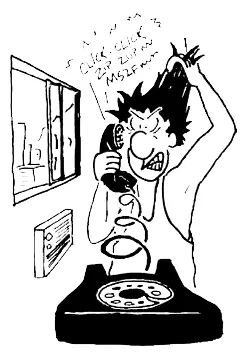Step 1.When the police officer approaches your car window, give him a thumbs-up, then say:
«E aí, seu guarda? Tá numa boa?»
(«So what’s up, Mr. Guard? Everything OK?»)
Step 2.If the issue at hand, for example, is an expired driver’s license, pull out your expired license and smile, saying:
«Olha so, seu guarda, o negocio e o seguinte…»
(«Look, Mr. Guard, the story is the following.»)
Don’t forget. Your explanation should be dramatic, taking no less than four minutes.
Step 3.If the officer doesn’t seem to be buying your story, and you still haven’t received the desired response, put on an innocent face and say:
«Seu guarda, num dá pra dá um jeitinho?»
(«Mr. Guard, isn’t there a way around this?»)

Of course, you may not get out of that ticket and paying that fine, but it is worth the try! And remember: since it is second nature, a true Carioca will always try the jeitinho.
When it’s time to grease the palm:It is at this point that a true Carioca will instinctively appeal to the generous nature of many Carioca officers by suggesting an agreement — along the lines of «You scratch my back and I’ll scratch yours.» In other words, the officer won’t have to fill out that tiresome paper work, and you won’t have to suffer any further inconveniences or delays. It’s been said that on occasion the officer himself might generously ask the motorist, «Do you want a multa(fine)?» In this case you are bound to have a clear shot at applying the jeitinho.
Whatever the circumstances, being a Carioca, offer half, insisting it is all you have. If agreed upon, friendly smiles will be exchanged, he will bid you a boa viagem(good trip), and you will be back on the road rapidinho(quickly) but not before receiving his kindly advice not to do whatever you did again. If you are on the highway, you may even receive a tip from your new friend, the police officer, on how to avoid the next police durathat is waiting for you a few kilometers down the road.
In an effort to protect innocent citizens from undesirable elements, Carioca police tend to be heavily armed. Therefore, it is important to heed the following recommendations whenever summoned by local authorities while on the road:
1. Always stop. If you don’t, you might find your car, or yourself, furnished with new air-conditioning vents. If you survive, the odds of developing a friendly relationship with the policeman, in this case, will be extremely poor.

2. Always smile and remain calm. By irritating the officer you might be taken to the police station where the jeitinhois more complex and more difficult to negotiate. Meeting the delegado(sheriff) could put a big dent in your style.
3. Do not let the officers impound your car. Since they will probably figure it is stolen — therefore free game — you stand a good chance of eventually recovering it free of hubcaps, radio, and tire jack — but complete with a new set of shiny smooth tires.
4. Don’t be fooled by the local patrol cars, those rusty camburaswith the balding tires. Even though there is a Carioca behind the wheel, they will never catch up to you — but you can be sure that their machine gun bullets will!
Lesson 15
Using the Phone

As you should know by now, Cariocas are seldom at a loss for words, and where better to exercise their talent than over the phone. Just when you think they are through talking, they get going again. By comparison, take Germans. Try saying something like «Boy, what about those interest rates» to a German over the phone and you’ll probably get a response along the lines of «Ya, very high.» That same comment to a Carioca, you won’t get another word in edgewise until it’s time for the novela das oitoor the line goes dead, whichever comes first.
Needless to say, Cariocas love to jogar conversa fora[joh ’gahh kon vehrr sah ’faw rrah] (chew the fat). It comes with the territory. So whether you are closing a deal or simply shooting the breeze with a beach buddy, include a healthy dose of at least one of the following the next time you make a call, and you, too, will be burning up the lines like a true Carioca:
• conversa mole[kohn ’vehrr sah ’maw lee]: a story that takes at least five minutes to tell and is full of holes.
• conversa fiada[kohn ’vehrr sah fee ’yah duh]: a story that takes at least five minutes to tell, is full of holes, and is never true.
• tititi[tchee tchee tchee]: a story about a third person that takes at least five minutes to tell and is not necessarily true. Also referred to as fofocaor lengo-lengo.
Contrary to what you may have heard previously, Rio’s telephone service is right up there with the First World’s. You can dial direct to most anywhere, public phones are plentiful, and cell phones are not only abundant, they are a must. So you might be asking yourself, «Why is there a lesson on using the telephone if the system is so great?» If you were a Carioca you wouldn’t ask that question.
Since using the phone in Rio is often an adventure, check out the following jeitinhos. They might be useful the next time you decide to let your finger do the walking.

Placing a call:If you pick up the phone and you don’t hear a hum, your phone is dead. Either grab your cell or go the nearest public phone, call the telephone company, and report it. The phone company representative will promise to send a technician around to fix it within forty-eight hours, and, if you’re lucky, you can rest assured he will arrive promptly ON the forty-ninth hour. In the event the technician gets lost, or is simply too busy to show up, grab your cell or go back to the nearest public phone, call the telephone company, and file a complaint. But remember! Do not ask to speak to a supervisor. If you do, within seconds you will hear a click, the line will go dead, and you will be forced to repeat the process.
Answering the phone:Your phone is working, the number you dialed is ringing, and — hallelujah! — someone is answering. Even though it is YOU who is initiating the call, do NOT ask to speak to someone specific. Believe me, if you don’t get that right, you won’t be fooling anyone. Instead, do as a Carioca does, and the phone call could begin something like this:
Person answering: «Alô?»(«Hello?»)
Correct response: «De onde fala?»(«From where are you talking?»)
Person answering: «Aqui e 5559–1234.»(«This is 5559–1234.»)
Correct response: «Com quem eu falo?»(«Who’s speaking?»)
Читать дальше
















